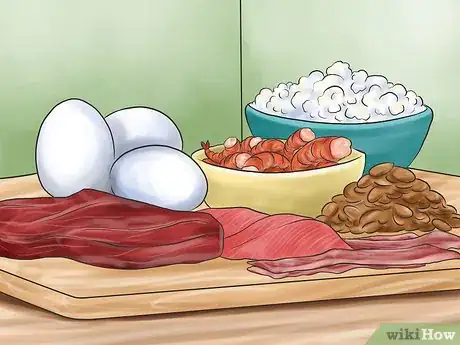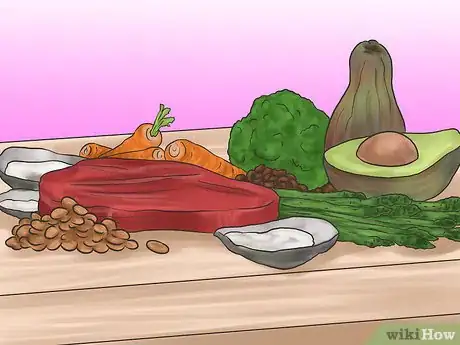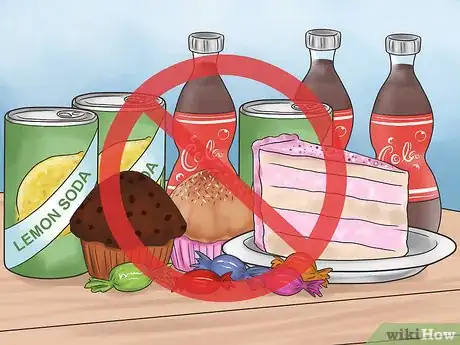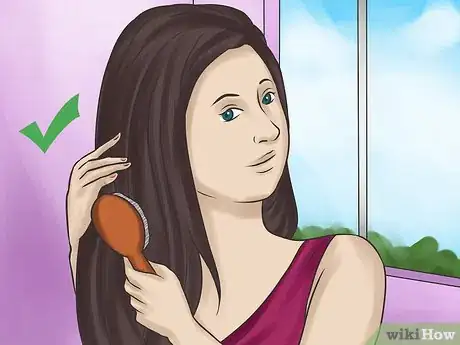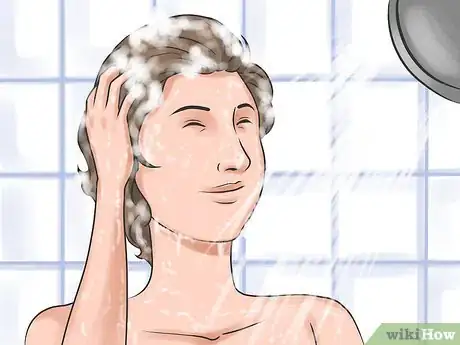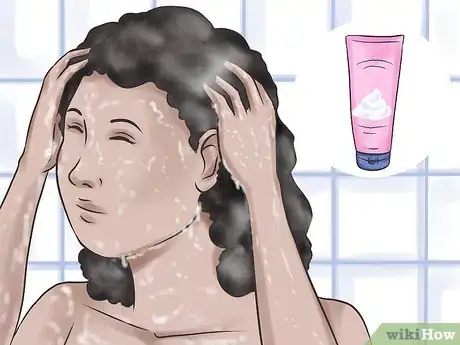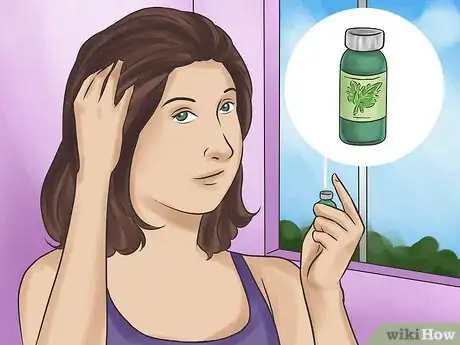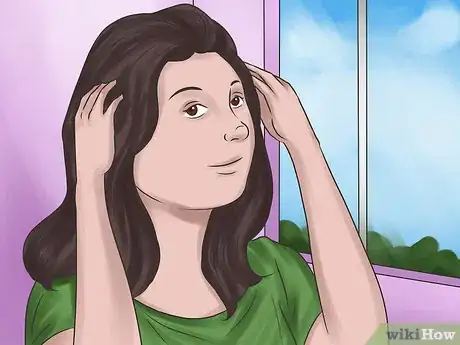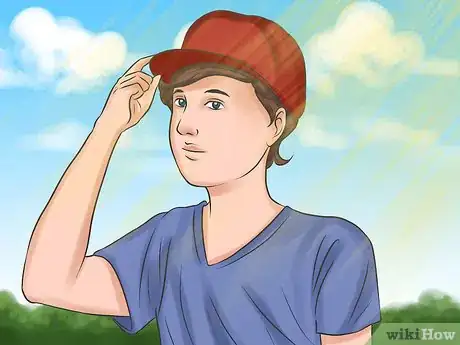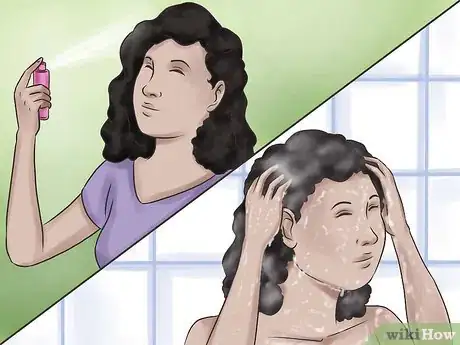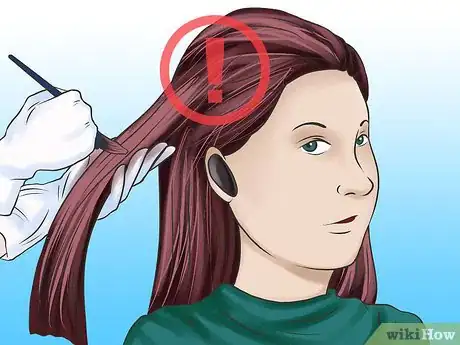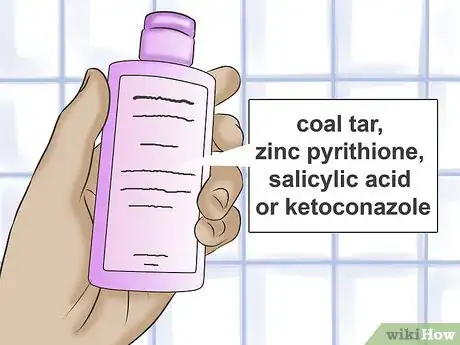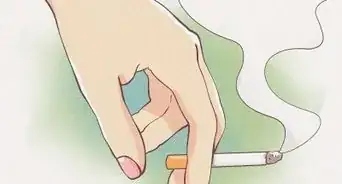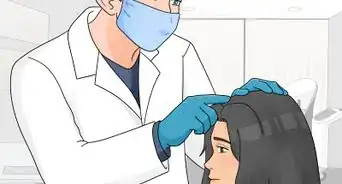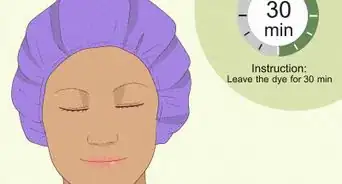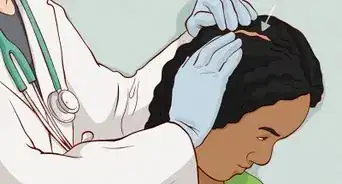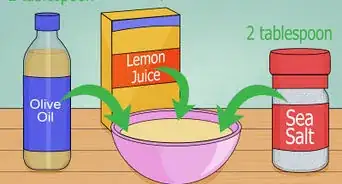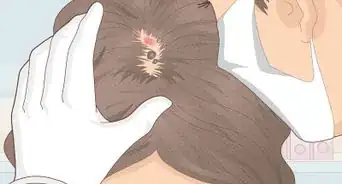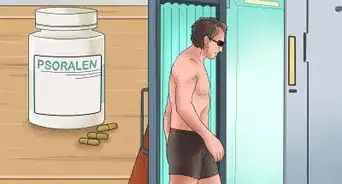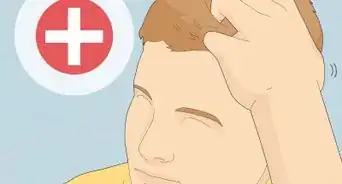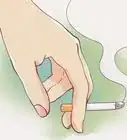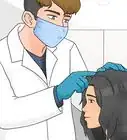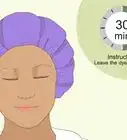This article was medically reviewed by Shun Pittman. Shun Pittman is a Master Cosmetologist, Author, Owner, and Founder of Corps d’Elite Salon and Corps d’Elite Beauty. With over 25 years of international experience, she is dedicated to and specializes in providing luxury salon services to all hair types and textures and every skin tone and shade. Her services include hair conditioning treatments, cutting, coloring, styling, extensions, and makeup application. Shun has experience working with, coaching, training, and mentoring beauty professionals from multiple companies including L'Oréal, Wella, Matrix, Paul Mitchell, Redken, Big Sexy Hair, and Toni & Guy. She is also a host for national and local media outlets and her work has been featured in The Washingtonian, The Cheddar Network, and WJLA Good Morning Washington's Beauty and Fashion Police segments. Shun is the author of “50 Things Your Hairdresser Wants YOU to Know (and a few things we don’t...)".
There are 17 references cited in this article, which can be found at the bottom of the page.
wikiHow marks an article as reader-approved once it receives enough positive feedback. In this case, 100% of readers who voted found the article helpful, earning it our reader-approved status.
This article has been viewed 160,570 times.
A healthy scalp is perhaps the most important component of a healthy head of hair. An unhealthy scalp will cause your hair to thin out and appear discolored or frail. You can easily maintain a healthy scalp by eating healthy foods, taking care of your scalp when you wash your hair, and by using self-care techniques to prevent damage to your scalp.
Steps
Maintaining a Healthy Diet for Your Scalp
-
1
-
2Eat your vitamins. Vitamin A and C help circulate oxygen to the scalp. To include these nutrients in your diet, eat blueberries, carrots, sweet potatoes, spinach, walnuts, and bell peppers[3] All of these foods include several nutrients that are conducive to a healthy scalp. You can also supplement your diet with daily multivitamins.[4]
- For vitamin C eat more bell peppers, blueberries, and dark leafy vegetables.
- For vitamin A eat sweet potatoes, dark leafy vegetables, and carrots.
Advertisement -
3Incorporate iron, zinc, and folic acid into your diet. Zinc will help keep hair on your head and dandruff off it. Folic acid will encourage cell renewal in your scalp. Iron helps prevent thinning and discoloration of your hair. Good sources of these nutrients include oysters, peas, lentils, and prunes.[5]
- For additional iron eat more beef, chicken liver, oysters, clams, mussels, and sardines.[6]
- For additional zinc eat more oysters, crab, lobster, meat, legumes, nuts, dairy products, and fortified cereals.[7]
- For additional folic acid eat more asparagus, broccoli, beans, lentils, avocado, okra, nuts, seeds, cauliflower, and carrots.[8]
-
4Cut down on sugar. Sugar consumption can aggravate a case of dandruff. Cut down on sodas, baked goods, and candy. Many processed foods also include a lot of sugar.[9]
Caring for Your Hair and Scalp Properly
-
1Brush your hair daily. Brushing your hair keeps it detangled, stimulates circulation, and distributes oil throughout your head. If possible, brush with a natural bristle brush. Plastic bristles do not spread oils as effectively as those made from plant or boar fibers.[10]
- Brush your hair gently, and only brush enough to remove tangles. Overbrushing can damage your hair.[11]
-
2Shampoo a minimum of once a week. Washing your hair too often will strip your hair of its natural oils. Washing less often will cause buildup to collect on the scalp and slow hair growth. If you have particularly oily hair, you can wash once a day with a gentle, sulfate-free shampoo.[12]
-
3Condition close to your scalp to moisturize it. This is particularly important after you shampoo, because shampooing can dry your scalp out. Be sure to condition your scalp every time you wash, starting at the ends and working up to about 1⁄4 in (0.64 cm) from your scalp.[15] [16]
- After you rinse out your conditioner, massage your scalp gently using your fingertips and work them around your scalp with small, circular motions.
-
4Apply essential oils. Massage essential oils into your scalp before you go to bed and shampoo them out when you wake up.[17] [18]
- Essential oils can be too powerful to apply directly into the scalp. Make sure that you purchase a mixture that is already diluted.
- Different oils are said to have their own distinctive effects. Basil is said to promote hair growth and treat oily skin. Lavender is a treatment for itchiness and dandruff.[19]
-
5Massage your scalp. Firmly rubbing and applying pressure to your scalp can increase circulation, preventing hair loss. Performing a scalp massage with essential oils can provide even more benefits. Try it while you're shampooing your hair or seek the assistance of a professional for greater benefit.[20]
- Press your fingertips into your scalp and apply gentle pressure. Then, move your fingers around your scalp using small, circular motions.
Preventing Damage
-
1Protect your scalp from the sun by wearing a hat. Getting a sunburn on your scalp causes the skin on your scalp to thin out. Eventually, this damage will produce thinning of your hair as well. To protect your scalp from sun damage, wear a hat when you know that you will be at risk of sunburn.
- Frequent use of a hat could cause tension around the hairline, promoting breakage. It's best to switch it up with a scarf so tension isn't on the same spot.[21]
-
2Replace your regular shampoo once a month with a clarifying shampoo. Products that hold your hair in place, like hairspray and gel, can cause buildup on your hair and scalp. The chemicals in these products may irritate your skin and hinder hair growth. If you use these products, use a clarifying shampoo once a month to remove buildup.[22]
-
3Be cautious if you feel burning or discomfort when you color your hair. It is not normal for your scalp to burn when you are having it colored. If it does, that means your scalp is too dry. Talk to your hair stylist about what you feel. Wash your hair less frequently—or use more gentle shampoo--and apply hair oil to your scalp more frequently.[23]
-
4Clean out dandruff. If you have white flakes accumulating on your shoulders, begin caring for your scalp with a special anti-dandruff shampoo. Look for shampoos that have anti-dandruff ingredients: coal tar, zinc pyrithione, salicylic acid, selenium, or ketoconazole.[24]
- If the dandruff persists after several weeks of treatment, visit a doctor for a prescription shampoo.
- Try applying aloe vera to your scalp to help heal any damage or abrasions.[25]
-
5Keep stress under control to prevent hair loss. High stress levels can cause your hair to fall out, so it is important to manage your stress. Talk to your doctor if your hair starts to fall out and you suspect that it may be due to stress.[26] Use a relaxation technique as part of your daily routine, and make sure to take time to do something you enjoy every day. Some good options for managing stress include:
Expert Q&A
Did you know you can get expert answers for this article?
Unlock expert answers by supporting wikiHow
-
QuestionHow do I repair a damaged scalp?
 Shun PittmanShun Pittman is a Master Cosmetologist, Author, Owner, and Founder of Corps d’Elite Salon and Corps d’Elite Beauty. With over 25 years of international experience, she is dedicated to and specializes in providing luxury salon services to all hair types and textures and every skin tone and shade. Her services include hair conditioning treatments, cutting, coloring, styling, extensions, and makeup application. Shun has experience working with, coaching, training, and mentoring beauty professionals from multiple companies including L'Oréal, Wella, Matrix, Paul Mitchell, Redken, Big Sexy Hair, and Toni & Guy. She is also a host for national and local media outlets and her work has been featured in The Washingtonian, The Cheddar Network, and WJLA Good Morning Washington's Beauty and Fashion Police segments. Shun is the author of “50 Things Your Hairdresser Wants YOU to Know (and a few things we don’t...)".
Shun PittmanShun Pittman is a Master Cosmetologist, Author, Owner, and Founder of Corps d’Elite Salon and Corps d’Elite Beauty. With over 25 years of international experience, she is dedicated to and specializes in providing luxury salon services to all hair types and textures and every skin tone and shade. Her services include hair conditioning treatments, cutting, coloring, styling, extensions, and makeup application. Shun has experience working with, coaching, training, and mentoring beauty professionals from multiple companies including L'Oréal, Wella, Matrix, Paul Mitchell, Redken, Big Sexy Hair, and Toni & Guy. She is also a host for national and local media outlets and her work has been featured in The Washingtonian, The Cheddar Network, and WJLA Good Morning Washington's Beauty and Fashion Police segments. Shun is the author of “50 Things Your Hairdresser Wants YOU to Know (and a few things we don’t...)".
Master Cosmetologist, Global Salon Educator & Author
-
QuestionDoes coal tar shampoo improve or encourage hair growth?
 Luba Lee, FNP-BC, MSLuba Lee, FNP-BC is a Board-Certified Family Nurse Practitioner (FNP) and educator in Tennessee with over a decade of clinical experience. Luba has certifications in Pediatric Advanced Life Support (PALS), Emergency Medicine, Advanced Cardiac Life Support (ACLS), Team Building, and Critical Care Nursing. She received her Master of Science in Nursing (MSN) from the University of Tennessee in 2006.
Luba Lee, FNP-BC, MSLuba Lee, FNP-BC is a Board-Certified Family Nurse Practitioner (FNP) and educator in Tennessee with over a decade of clinical experience. Luba has certifications in Pediatric Advanced Life Support (PALS), Emergency Medicine, Advanced Cardiac Life Support (ACLS), Team Building, and Critical Care Nursing. She received her Master of Science in Nursing (MSN) from the University of Tennessee in 2006.
Board-Certified Family Nurse Practitioner
-
QuestionHow can I get a strong, clean, and healthy scalp?
 Luba Lee, FNP-BC, MSLuba Lee, FNP-BC is a Board-Certified Family Nurse Practitioner (FNP) and educator in Tennessee with over a decade of clinical experience. Luba has certifications in Pediatric Advanced Life Support (PALS), Emergency Medicine, Advanced Cardiac Life Support (ACLS), Team Building, and Critical Care Nursing. She received her Master of Science in Nursing (MSN) from the University of Tennessee in 2006.
Luba Lee, FNP-BC, MSLuba Lee, FNP-BC is a Board-Certified Family Nurse Practitioner (FNP) and educator in Tennessee with over a decade of clinical experience. Luba has certifications in Pediatric Advanced Life Support (PALS), Emergency Medicine, Advanced Cardiac Life Support (ACLS), Team Building, and Critical Care Nursing. She received her Master of Science in Nursing (MSN) from the University of Tennessee in 2006.
Board-Certified Family Nurse Practitioner A strong, clean and healthy scalp starts with a healthy lifestyle: following a good diet, exercising, getting plenty of rest and sleep, and using stress reduction techniques all go a long way towards keeping your scalp healthy. Wash your hair every 3 days, use clarifying shampoo once every 2 weeks, and massage essential oils into your scalp before you shampoo to get a clean and healthy scalp over time.
A strong, clean and healthy scalp starts with a healthy lifestyle: following a good diet, exercising, getting plenty of rest and sleep, and using stress reduction techniques all go a long way towards keeping your scalp healthy. Wash your hair every 3 days, use clarifying shampoo once every 2 weeks, and massage essential oils into your scalp before you shampoo to get a clean and healthy scalp over time.
References
- ↑ http://www.the-dermatologist.com/content/maintaining-healthy-scalp-and-hair-improved-hair-growth
- ↑ http://www.indiatimes.com/health/healthyliving/healthy-hair-20-best-foods-for-healthy-hair-and-scalp-236108-21.html
- ↑ http://www.indiatimes.com/health/healthyliving/healthy-hair-20-best-foods-for-healthy-hair-and-scalp-236108-15.html
- ↑ http://www.the-dermatologist.com/content/maintaining-healthy-scalp-and-hair-improved-hair-growth
- ↑ http://www.indiatimes.com/health/healthyliving/healthy-hair-20-best-foods-for-healthy-hair-and-scalp-236108-4.html
- ↑ http://www.webmd.com/diet/iron-rich-foods
- ↑ http://www.everydayhealth.com/pictures/best-food-sources-zinc/#10
- ↑ http://www.globalhealingcenter.com/natural-health/folic-acid-foods/
- ↑ http://www.healwithfood.org/dandruff/diet.php
- ↑ http://www.prevention.com/beauty/scalp-health-tips
- ↑ Shun Pittman. Master Cosmetologist, Global Salon Educator & Author. Expert Interview. 2 December 2021.
- ↑ http://www.prevention.com/beauty/scalp-health-tips
- ↑ Shun Pittman. Master Cosmetologist, Global Salon Educator & Author. Expert Interview. 7 September 2021.
- ↑ https://www.pgeveryday.com/health-wellbeing/healthy-living/article/top-tips-for-a-healthy-scalp
- ↑ Shun Pittman. Master Cosmetologist, Global Salon Educator & Author. Expert Interview. 7 September 2021.
- ↑ http://www.prevention.com/beauty/scalp-health-tips
- ↑ Shun Pittman. Master Cosmetologist, Global Salon Educator & Author. Expert Interview. 2 December 2021.
- ↑ http://www.prevention.com/beauty/scalp-health-tips
- ↑ http://www.chagrinvalleysoapandsalve.com/idascorner/ingredients/ingredients-faqs/essential-oil-faqs/essential-oils-used-in-hair-care
- ↑ http://www.pacificcollege.edu/news/blog/2015/02/01/benefits-scalp-massage-hair-loss
- ↑ Shun Pittman. Master Cosmetologist, Global Salon Educator & Author. Expert Interview. 2 December 2021.
- ↑ http://www.prevention.com/beauty/scalp-health-tips
- ↑ http://www.allure.com/beauty-trends/blogs/daily-beauty-reporter/2013/06/7-ways-to-get-a-healthy-scalp-and-longer-hair.html
- ↑ http://www.webmd.com/skin-problems-and-treatments/scalp-problems
- ↑ Shun Pittman. Master Cosmetologist, Global Salon Educator & Author. Expert Interview. 7 September 2021.
- ↑ https://www.mayoclinic.org/healthy-lifestyle/stress-management/expert-answers/stress-and-hair-loss/faq-20057820
About This Article
For a healthier scalp, brush your hair every day to stimulate blood circulation and distribute natural oils throughout your head. Wash your hair once every 2 or 3 days, taking care to massage your scalp with shampoo to remove dead skin cells and encourage circulation. After you shampoo, be sure to rub conditioner deep into your scalp to moisturize it, as shampoo can dry out your skin. You can also stimulate hair growth and prevent dandruff by massaging essential oils like basil or lavender into your scalp once every 2 or 3 days before you go to bed. Once per month, use an exfoliating shampoo to scrub dead skin away and unblock your hair follicles. For more tips from our Medical co-author, like how to promote scalp health with your diet, keep reading!
